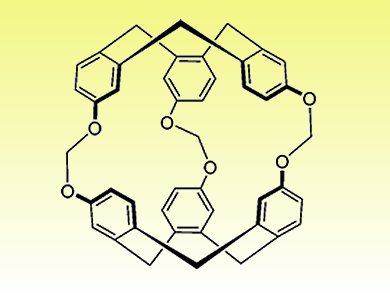Laser-polarized 129Xe NMR spectroscopy is a very attractive tool for magnetic resonance imaging (MRI). Xenon is a nontoxic gas, soluble in biological fluids, and readily delivered by inhalation. The enhanced NMR signal also means small quantities of the gas can be easily detected. However, xenon is not selective and so biosensors, able to encapsulate xenon and bind to a specific target, are particularly attractive.
Bernard Rousseau and colleagues, Commissariat à l’énergie atomique et aux énergies alternatives, France, have synthesized a functionalized molecular cage that could be modified to recognize a specific biological target. Based on cryptophane-111 (pictured), the cavity has a high affinity for xenon in both organic solvents and water. Synthesized in three steps from cryptophane-111, this cage could be further derivatized to form specific bioprobes.
The researchers now aim to graft the cage onto various biomolecules through amide bond forming reactions.
- Synthesis of a Functionalizable Water-Soluble Cryptophane-111,
E. Dubost, N. Kotera, S. Garcia-Argote, Y. Boulard, E. Léonce, C. Boutin, P. Berthault, C. Dugave, B. Rousseau,
Org. Lett. 2013.
DOI: 10.1021/ol4012019




